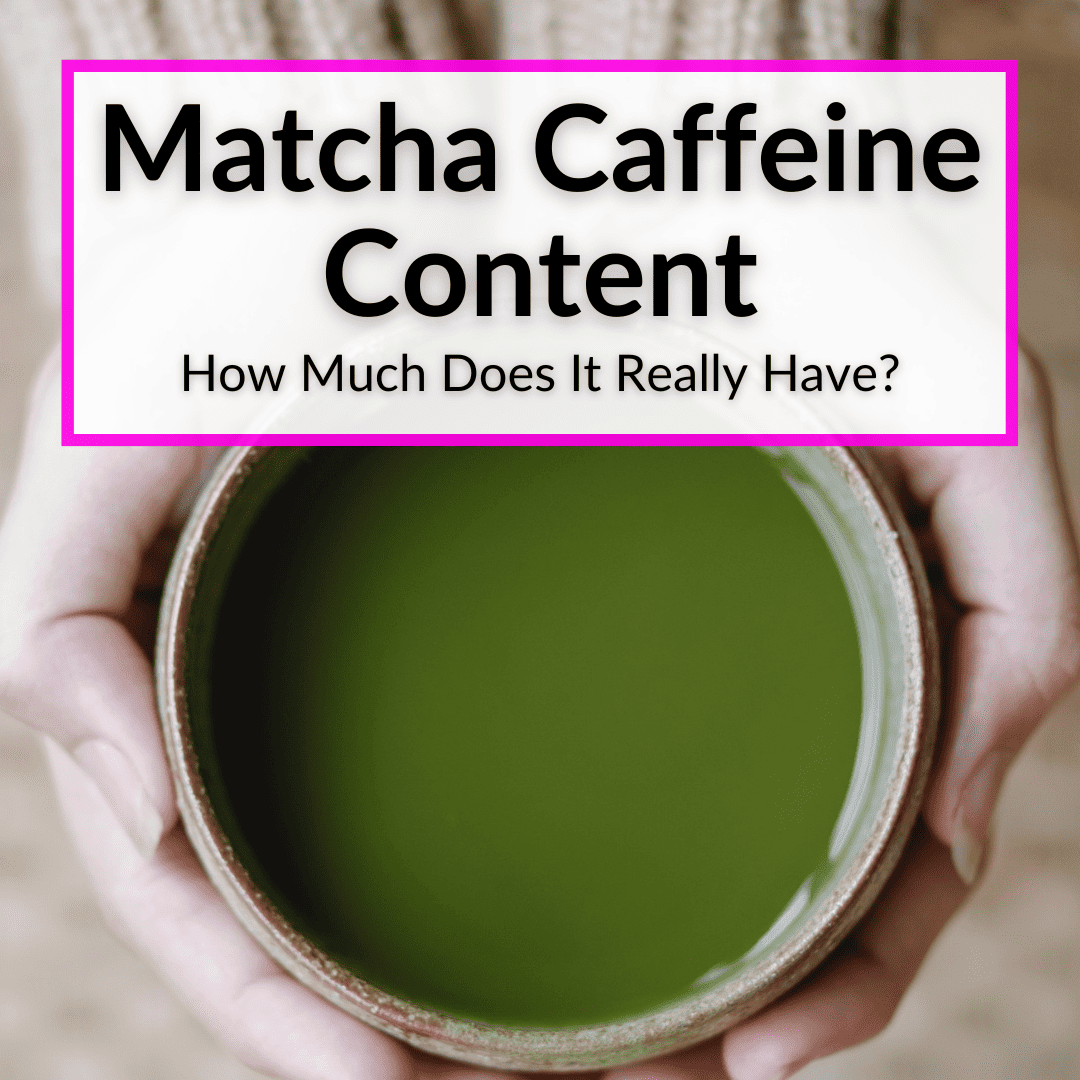 Matcha is having a moment.
Matcha is having a moment.
It is being touted as a healthy drink and its popularity has skyrocketed as a result.
And rightfully so. It is healthy and it is also delicious.
But it is important to understand that the matcha caffeine content is much higher than other teas.
Does it have as much as coffee? Could it be a good substitute for coffee then?
It does not, but it could. The caffeine high from matcha is different.
It works for some. It does not for others. Some prefer it to coffee, while others don’t like it at all.
What does that mean exactly? Keep reading to learn all about the caffeine content of matcha and how it compares to coffee and to other teas.
Table of Contents
Matcha Caffeine Content
Matcha contains, on average, 30 mg of caffeine per gram. If you use 2 scoops (around one tsp or 2 grams) of matcha powder per cup (6 fl. oz.), then the caffeine content of your matcha tea will be 60 mg, on average.
But that is just an average. The caffeine content of matcha powder can vary greatly. As can the amount you use. As a result, a cup of matcha can have anywhere from 30 mg of caffeine to 130 mg.
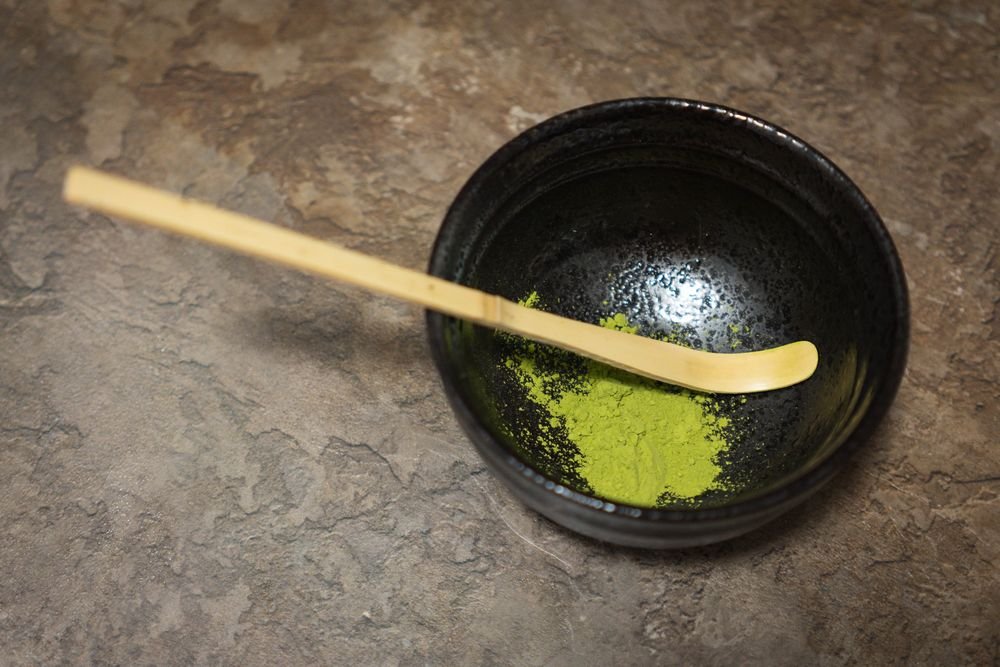
To give you some perspective, the average caffeine content in one cup of plain black coffee is 120 mg, and that in a cup of black tea is 50 mg. On average, one cup of plain green tea contains just 40 mg of caffeine.
Again, please note that the caffeine contents of matcha green tea, coffee, and other teas can vary based on the processing and brewing methods used. These are just averages.
Why Does Matcha Have So Much Caffeine?
Many people enjoy drinking matcha for its numerous health benefits. Mainly, the tea is appreciated for its high antioxidant content, since antioxidants help delay aging, fight diseases, and boost overall health and well-being.
However, matcha is far from caffeine-free. In fact, as seen above, matcha contains more caffeine than plain green tea, white tea, oolong tea and black tea. Here are the main reasons matcha has more caffeine than other types of tea.
Method Of Growing
High-quality matcha is produced from the leaves of the Camelia Sinensis plant, just like all other true teas. But the leaves used for matcha are grown in the shade.
The shading process enhances matcha’s chlorophyll and L-theanine contents, due to the lower exposure to sunlight. It also increases matcha’s caffeine content.
Black tea is also made from the Camelia Sinensis plant but the leaves are exposed to the sun, which decreases its caffeine content slightly.
Green tea is also made from the Camelia sinensis plant but most green teas uses a semi-shading process. These differences in growing methods alter the tea leaves’ caffeine content, though the effect is not huge.
Method Of Processing
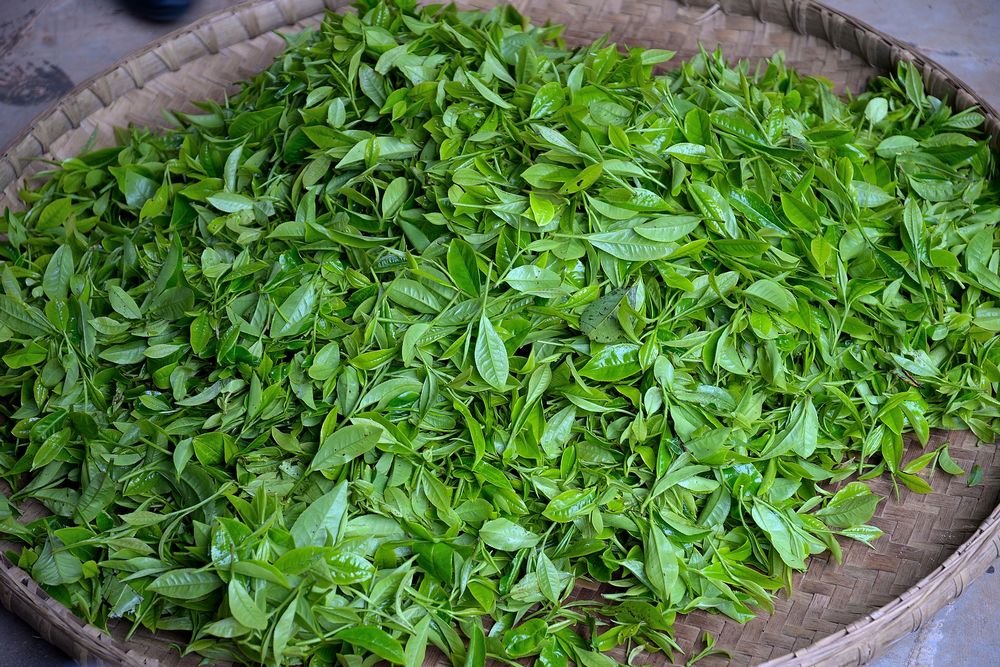
When matcha is processed, the entire tea leaf is used. The leaves are ground whole, including the buds, stems, etc. In black tea, the leaves are oxidized after being rolled. In green tea, the leaf’s veins and stems are removed prior to processing.
And due to the whole-leaf utilization processing, matcha has a higher caffeine content than black and green teas. But again, this does not make a huge difference either. What makes the biggest difference is the way you brew matcha.
Method Of Brewing
Traditionally, matcha tea is brewed by whisking the finely ground matcha powder in hot water. This means that you consume the tea leaves entirely and nothing is filtered out. Moreover, matcha also uses a higher leaf-to-water ratio, which further enhances the tea’s caffeine content.
On the other hand, in green and black teas, the leaves are first steeped in hot water and filtered out. This greatly reduces their caffeine content, because only a fraction of the tea’s caffeine enters the tea during steeping.
Matcha Vs Coffee Caffeine Content
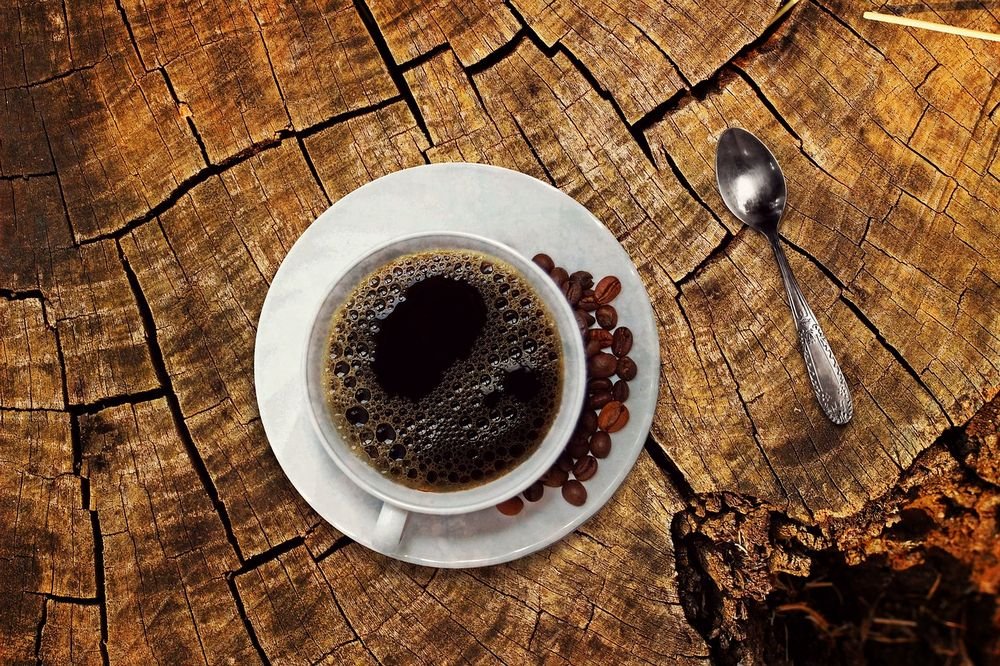
Here is a comparison of the caffeine content of matcha vs coffee. This is for plain matcha and plain black coffee. If you add milk or something else, the caffeine content changes.
Caffeine In Matcha
As mentioned before, matcha powder contains around 30 mg of caffeine per gram. If you add one teaspoon (2 grams) of matcha powder per cup (6 fl. oz.), then its caffeine content, on average, will be 60 mg.
Caffeine In Coffee
On the other hand, the average caffeine content in one cup of plain black coffee is 120 mg. Decaffeinated coffee contains just 2 to 5 mg of caffeine per cup, which is significantly lower than matcha and regular coffee.
It is essential to understand that matcha tea also contains L-theanine. This amino acid promotes a slower, more sustained release of caffeine, which results in a calmer, longer-lasting energy boost without the coffee jitters.
Matcha Caffeine Content Vs Green Tea
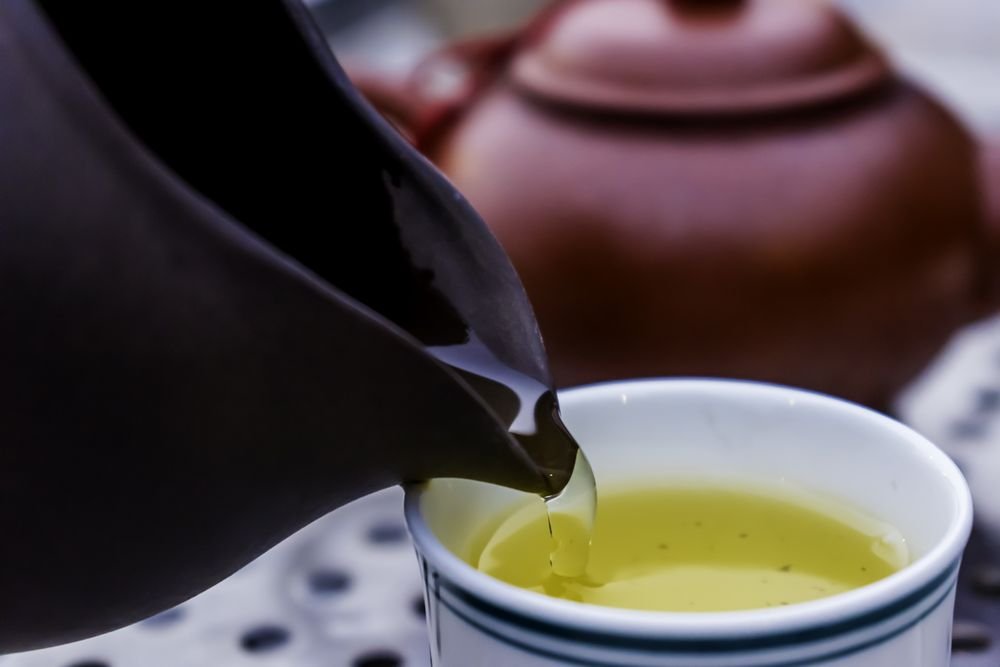
Caffeine is a natural stimulant that, in moderation, has many health benefits. These include boosted energy levels, enhanced adrenaline production, and an increase in brain activity.
However, many people are sensitive to caffeine and tend to suffer from restlessness, shaking, insomnia, headaches, increased heart rate, anxiety, etc. If you are concerned (or looking for) about a high caffeine content, here is how matcha and green tea compare.
Caffeine In Matcha
Again, matcha typically contains around 30 milligrams of caffeine per gram of tea powder. A standard serving of matcha, which uses 2 grams of powder, contains around 60 milligrams of caffeine. This concentration is a lot higher than that found in most other types of tea.
If you’re looking to reduce your caffeine intake, you could adjust the quantity of matcha powder you use in the tea, or even opt for decaffeinated matcha options. Remember: while matcha has more caffeine than green tea, its caffeine content is still a lot less than that of coffee.
Caffeine In Green Tea
Green tea has a moderate caffeine content, averaging about 30 to 40 milligrams per 8-ounce cup. However, this can vary depending on factors like the tea variety and brewing time. If you steep your green tea longer, its caffeine content will increase.
How Much Caffeine In 2 Cups Of Matcha?
Two cups, or about 12 fluid ounces, of matcha could contain anywhere from 70 to 260 milligrams of caffeine, with the average being around 120mg. However, the exact caffeine quantity will depend on factors like the amount of matcha powder you use and the exact serving size.
This caffeine content is roughly equivalent to one cup of regular coffee. If you’re sensitive to caffeine, you might want to adjust the quantity of matcha you use or choose a smaller serving size. You could also opt for decaf matcha powder to brew your tea.
Do Matcha Lattes Have Caffeine?
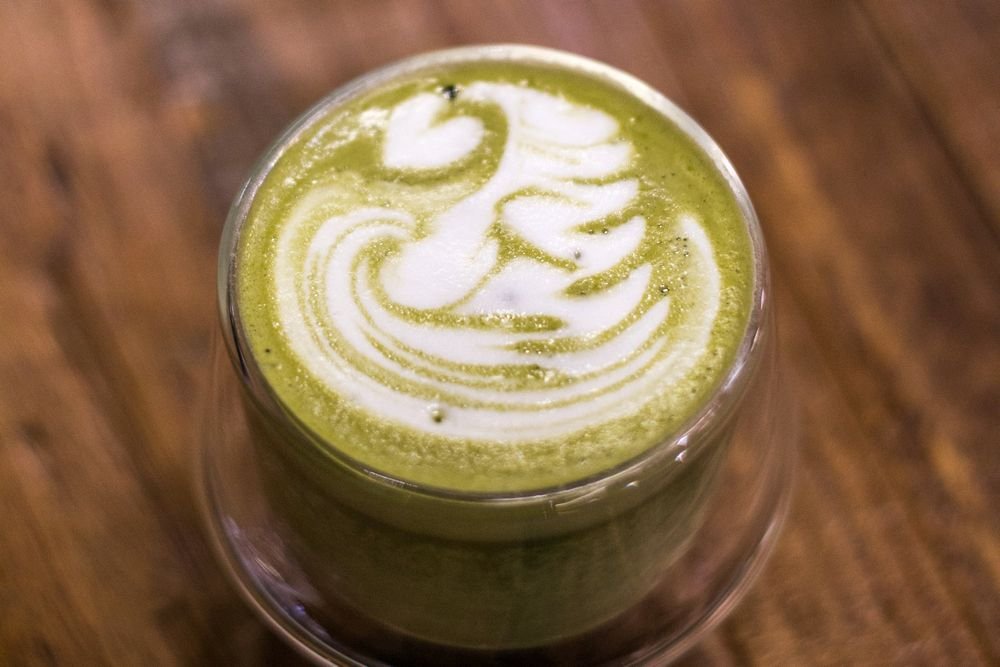
Yes, matcha lattes do have caffeine, since matcha powder contains caffeine. As mentioned above, matcha tea uses the entire tea leaf. When you make matcha latte, you do not filter out the matcha powder either, so the latte will contain a significant amount of caffeine per cup.
If you use about 1 gram of matcha powder to make your latte, you will have about 30 mg of caffeine in it. Note that this is significantly less than regular lattes. For example, Starbucks lattes made using a single shot of espresso are known to contain around 150 mg of caffeine in 8 ounces.
If you’re looking to reduce your caffeine intake, you could adjust the quantity of matcha powder you use in your latte, or even opt for decaffeinated matcha options.
How Much Caffeine Does Matcha Have: Final Thoughts
Matcha contains a lot more caffeine than other teas, but it still contains far less than coffee. In general, you need two cups of matcha to get the same amount of caffeine as one cup of coffee.
But the two are still not equal. The l-theanine content of matcha changes things. It results in a much mellower caffeine high than coffee. Basically, you feel the same alertness, minus the jitters.
Of course, not everyone gets jitters from coffee. And not everyone who gets the jitters considers it a bad thing. But if you do and you wish you didn’t, matcha may be your answer.
Do you have a list of the amount of caffeine in different brands of matcha? I try to limit the amount of caffeine that I consume.
Thanks in advance